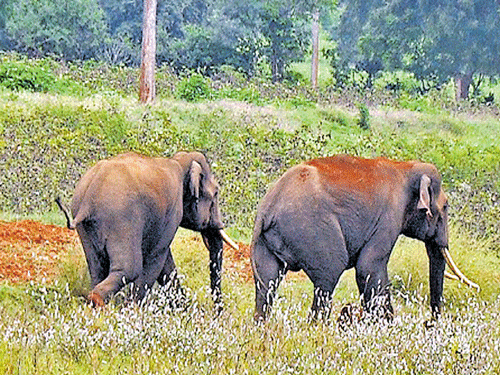
The difference between Asian and African elephants are not just their ears and tusks, but also their genes and interestingly their sense of smell.
A team of researchers from Centre of Ecological Sciences, Indian Institute of Science and Centre for Excellence in Epigenetics, Indian Institute of Science Education and Research, has done a comparative study of the gene of Asian and African elephants and published a research paper – Comparative sequence analyses of genome and transcriptome, which reveals novel transcripts and variants in Asian elephant (Elephas Maximus).
Researchers have sequenced the genome of Asian elephant from Karnataka and identified more than 1,500 genes that harbour changes specific to the Asian elephant when compared to the African elephant. One of the most significant subset of these genes was found to be involved in olfaction, and possibly indicates an evolutionary adaptation to differences in the chemical signals that the Asian elephant lineage encountered after it moved out of Africa, said Prof Raman Sukumar, noted elephant ecologist and CES, IISc professor.
Explaining the study, post doctoral fellow, CES, IISc, Ishani Sinha told Deccan Herald that a unique aspect of the study is the feature on difference in sense of smell. Ancestors of Asian elephants which originated and evolved in Africa, moved to Eurasia over the years. They came across different regions, environment, climates, vegetation patterns, glaciation events that were different from Africa and have adapted to them. So over the years, different smell genes have evolved in Asian elephants. So Asian elephants can smell different things and more than that of African elephants.
Referring to another study, Ishani said, it has been established that the female reproductive pheromones are different in case of Asian and African elephants. These also have different smells as it is a different chemical structure and males can easily differentiate between them.
The study was done over a period of two years and for the first time the team sequenced the part of the genome that is expressed from the white blood cell of an elephant. This sample was collected from one of the camp elephants in Bandipur Tiger Reserve, Sukumar said.
So far many observational studies have been done on elephants, but this is the first gene study. The study will help analyse and understand the reason behind the behaviour and characteristics of Asian and African elephants. “This is important because elephants are very intelligent animals and they share and pass on information to others and young ones based on experiences and adaptations.
This is the first study and the team has already started work on part two of the research paper where we are planning to sequence more genome of Asian elephants, assess a bigger population and transcriptome of different tissues,” Ishani added.